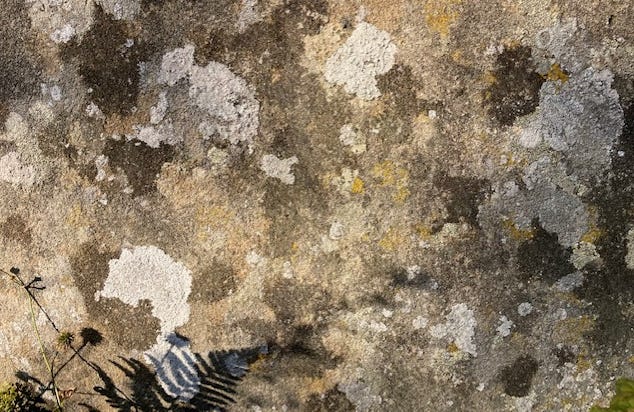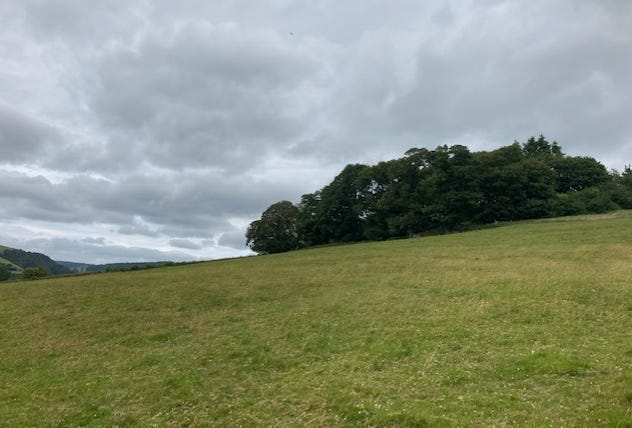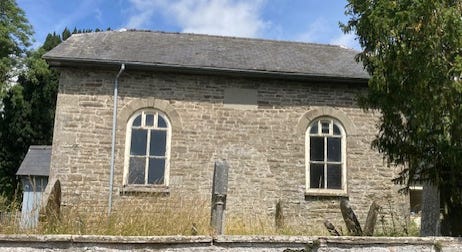ADULLAM
STA IN INTERESTING TIMES
It is June 22nd. This edition of The Familiar is due to appear in three weeks’ time. By then we may have been obliterated in a global firestorm or, given the unpredictability of international politics now, all may be so quiet that you have already forgotten what I’m referring to – the exchange of bombardment between Israel and Iran and, yesterday, America’s bombing of Iran’s nuclear facilities. No one, including the combatants I suspect, has a clue what’s next.
I spent the day doing bits and bobs and then drove three miles north to Adullam, a disused chapel in Painscastle, and looked at the lichen painting stars and stormscapes with infinite slowness on the walls and graves.
When Great Events are taking place elsewhere, it’s difficult to avoid a sense of irrelevance whatever you do. Everyday life is drained of its vitality while we gawp at the newsfeeds, spectators on the world. The media, by contrast, are full of pep. “Stick it up your bunker!” The Sun guffawed this morning. There’s a frisson of exhilaration the reporters never show when they’re talking about social care or the climate catastrophe. The future of the world is being written in the skies over Jordan and this drab chapel in mid-Wales is neither here nor there.
Modern humans are alone in thinking like this. No sparrow could imagine that the behaviour of another sparrow, let alone one thousands of miles away, was more important than its own. They are always participants, never spectators. Life is where they are, here not there, and their only role, in Spinoza’s phrase, is ‘striving to persist in their own being.’
Some might claim that Israel is facing a similar existential struggle, but there is a significant difference. The creatures in the chapelyard have an objective reality as proven by their inter-relations. The sparrow recognises the butterfly which knows the nettle and so on. Israel does not possess that same fundamental reality, nor does the Islamic Republic of Iran, the United States, nor, for that matter, Painscastle – they are concepts, labels we have attached to places. This is not the world. It is a novelisation of the world, persuasively illustrated with maps and flags. The land itself knows nothing of these made-up names, sparrows and butterflies know no frontiers. If a mole tunnels under the Israel-Palestine border, does it count as an incursion? Does a swift on its migration violate Iranian airspace? Is Israeli thistledown landing in the West Bank making an illegal settlement? Our nations, frontiers, races are human-centred inventions. In the real world, the world of physical biology, there is no categorical difference between Israelis and Palestinians. The deaths and the devastation are tragically real, the reasons behind them are fantasies.
Painscastle is a quiet place – a pub, twenty or thirty houses and this abandoned chapel – but eight centuries ago, this was Gaza. This stretch of the border between England and Wales is the most heavily fortified area in Europe, though the castles are now only stumps like broken teeth or bumps on a hill whose stones have long since been carted away. Two hundred yards south of the chapel is one such grassy tump with a few sheep and some rusting machinery, but here in August 1198 was a battle as bloody and brutal as anything the Middle East has known. On a morning just as sweet as this, two armies hacked, slashed, gored each other until three thousand or more lay dead and the little stream at the foot of the hill, the Bachawy, ran red with their blood. When I took this photo of the battlefield, a single red kite flew over; there would have been many more that day.
There are no plaques or tourist information. The struggle is forgotten, the leaders unknown, the motives – it was a ruinous attempt by the Welsh to recapture the fortress from the Normans – long superseded. Painscastle is now several miles inside Wales, the frontier redrawn at some later date by men in quiet rooms. The old dissensions are buried, the Normans are natives now. The border itself goes largely unnoticed. Occasionally, a road sign reminds you or sometimes the council mows the verge up to where it guesses its responsibilities end. So, this cut blade of grass is English, this long one by its side is Welsh. It’s silly, but no one’s killing anyone about it. We’ve all moved on.
There is little sign that Khamenei, Trump and Netanyahu give a damn about international public opinion, but we can hope, pray, petition for ceasefires, de-escalations, short-term solutions, for the wisdom of those people in quiet rooms who at some point awarded Painscastle to the defeated Welsh. I can’t presume to opine about what those solutions might be. When Hamas launched its incursion in October 2023, killing twelve hundred people and taking many hostages, worried diplomats urged Israel to be ‘proportionate’ in its response. But what is ‘proportionate’? To kill twelve hundred Palestinians, to kill only the killers, to prevent any potential recurrence by massacring all Palestinians? How many corpses is permissible? Was the Hamas attack itself a ‘proportionate’ response to decades of...? The questions are futile, only tinder for the next conflagration, because they entrench the basic assumptions of national, racial, religious difference which began the conflict long ago.
STA is a world-view with very different and better-evidenced assumptions. It begins four billion years ago with the first living cells on Earth and the fact that every organism on the planet – from lichen and grasses to Trump and Khamenei – is descended from them and therefore related. This is the deep history of where we come from; the names that divide us are a modern invention.
When viewed from STA’s planetary perspective, the murderous bickerings in the Middle East are obscenely beside-the-point, almost sacrilegious . We know we are a part of this billions of years old creation alongside an infinity of other creatures, each minusculely different from each other, yet combining into a richness of unfathomable complexity. To ignore all this and kill people of whom you know nothing except the generic name you have given them is the greatest existential failure imaginable.
Because there is just a single creation, there is no natural hierarchy. Every creature, every place, every moment is equal. You are standing at the centre of the world, so am I, so is each of us. It is a polycentric world, as every sparrow and nettle knows. (The argument is made more fully in the book Do Not Call the Tortoise.) This unspectacular chapel in Painscastle is crucial as Jerusalem or New York. From here you can trace your connection to every living thing (and, the gravestones remind us, every thing that has ever lived) in a single continuum without contradiction. This is our bedrock; here we can construct an understanding of the world based on the undeniable realities of water, stone, flesh, life not the fantasies of names, nations, allies and enemies.
But our social, cultural world of human ideas is different. They are not part of the evolved nexus of reality – they’re made up. You cannot begin with Netanyahu’s world-view and segue into Khamenei’s or Trump’s because they are designed to be mutually contradictory. No baby is born knowing the difference between Jew and Arab or England and Wales. These are tales told to steal from children the common affinity which is their birthright, and offer instead a narrower belonging based on exclusivity and prejudice. Conflict is inherent in these learnt allegiances. In all the evils that blight the Middle East there are perpetrators and victims (and many who are both victims and perpetrators; abuse breeds abuse). It is this, their behaviour, that identifies them, not the name-tags of race or nation.
The historian Yuval Noah Harari claims that humans’ greatest achievements have come about because of the stories we have told. “Stories are tools. They can be very helpful, but if a particular story makes people miserable instead of helping them, why not change it? The world ... needs dreamers to weave well-intentioned stories to spark our collective imagination.”
But Israel already has a story it likes even though it makes the Palestinians miserable, and the Israelis don’t like the story Ayatollah Khamenei tells, and he never liked the one the Shah used to recount. None of them wants to give up their cherished tales. How can Harari’s ‘well-intentioned stories’ convince when they are clearly as arbitrary as the others? They merely perpetuate our chaos of subjectivity.
STA looks for something more reliable. It digs down deep below the stories, beginning long before the words and names that have shattered our unified creation. I cannot be completely objective (which is why STA urges everyone to stand still and consider for themselves) but we can build on a firm foundation of known facts rather than the capricious propaganda of tradition, scripture or Harari’s new-minted fictions. Our Common Ancestry is not a ‘story’ woven by well-intentioned dreamers; it is a scientific fact encoded in DNA. Every cell in the world attests it.
I didn’t go to Adullam by chance. The Welsh Nonconformists of the 18th and 19th centuries hoped to recreate the Holy Land in these green valleys and named their chapels after Old Testament places. Adullam was the cave where David took refuge from another murderously insecure Middle Eastern dictator, King Saul. Adullam means ‘refuge.’ Is gazing at these lichens, sitting among the ferns, the butterflies and birds escapism? I don’t think so, and nor do the creatures around me. The sun and wind, the grasses brushing my skin are real, as real in their beauty as Gaza is real in its present horror. There is a bond of true physical, organic existence between me, the lichen, the birds, the bodies in Palestine, the people who murdered them, a bond which is an affinity of being. From this sure refuge we can restore our perspective, our sense of hereness, uniqueness and universal connection.
According to the Book of Samuel, “David therefore departed thence, and escaped to the cave Adullam, and ... every one that was in distress, and every one that was in debt, and every one that was discontented, gathered themselves unto him.” That embraces more and more and more of us. ‘Those who feel the breath of sadness, Those who find they’re touched by madness, Those who find themselves ridiculous ... Oh, sit down in sympathy,’ as it was expressed in a pop anthem three millennia later.
Adullam is a rallying-point for us all and, in our polycentric world, everywhere is Adullam. It is a place of adamant reality, where creatures – this fern, me, you, that mouse – exist in their original simplicity and complexity free of the tendentious manipulations of language. It rejects the divisive patterns of thought that dictators and plutocrats and the media love and which, in their blatancy, appeal to many of us too stressed and tired to bother with nuance. The demagogues, influencers and celebrities think they dominate the world because they dominate the media, but they do not know the vastness of the context we inhabit. The world is infinitely wider than the world wide web and deeper and more complex than the little screen in my hand can show. Once we know the breadth and depth of reality, we need no longer be seduced by mere words.
To put it simply (and, admittedly, slightly – but only slightly – too simply):
The real things unite us – physical existence, DNA, individuality, interdependence, the need for food, water, oxygen, light, our obedience to all the cosmic forces some of which we have identified as scientific laws.
The made-up things divide us – categories, money, ownership, nations, races, classes, etc.
It is perhaps obvious that a system that has been operating for four billion years is more sustainable than our new untested inventions. Of course, there is killing in the natural world - orca and seal, owl and mouse, even slug and lettuce - but for physical survival, ‘to persist in their own being’, not for names.
This is not ‘a story’. It is, empirically and scientifically, how the world works. But if I were to claim that it will overthrow our political system, as David succeeded Saul – well, that would indeed be the wildest romancing.




